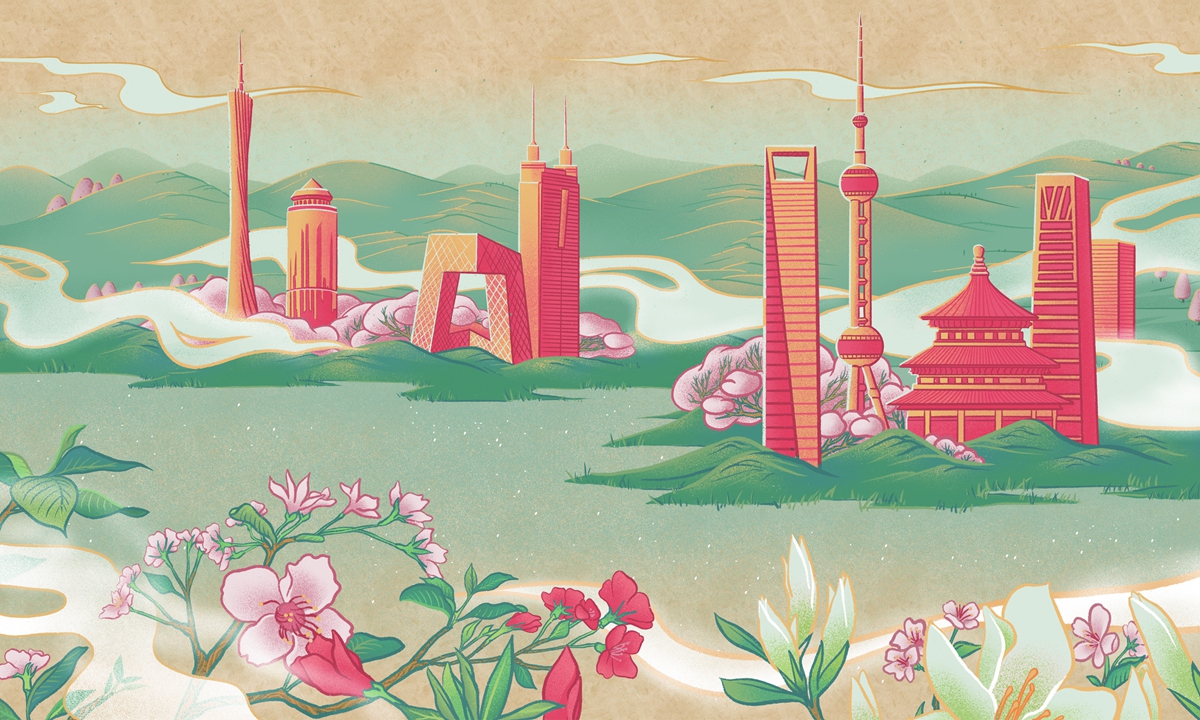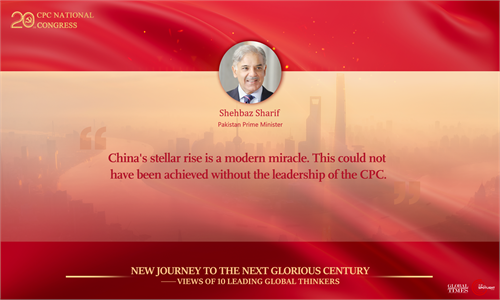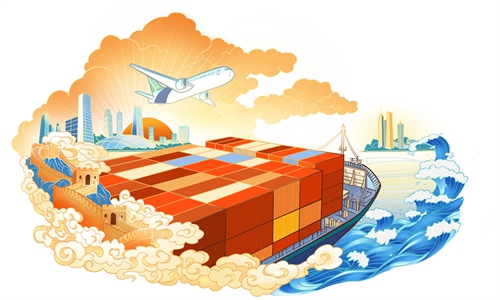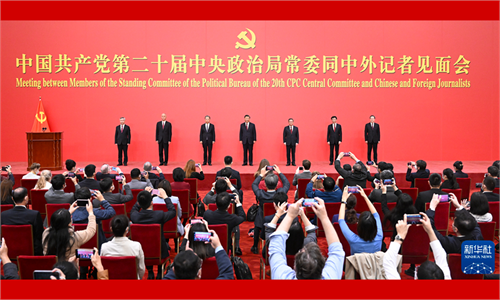Socialism with Chinese characteristics shows paradigm for other countries: Italian scholar

Photo: VCG
Editor's Note:China had an epic decade since 2012. Particularly in the last five years, which are truly momentous, extraordinary, the country has successfully dealt with major challenges including turbulent developments in Hong Kong Special Administrative Region and the COVID-19 epidemic. The 20th National Congress of the Communist Party of China (CPC) has laid out plans for the strategic missions and major measures in the next five years, getting the efforts to build a modern socialist country in all respects off to a good start.
In a recent interview with Global Times (GT) reporter Xia Wenxin, Francesco Maringiò (Maringiò), an Italian China expert and president of the New Silk Road Promotion Association of Italy, shared his views on China's success in the past 10 years, and how the Chinese governance can provide a reference for other countries.
GT: What aspects of China's development have impressed you the most in the past 10 years?
Maringiò: In the last 10 years, I've traveled a lot in China. What impressed me much in every single visit was that I could see how the country and people became wealthier time by time. That means, in my comprehension, the wealth produced in China was well-distributed across the country and among the people.
That is not the case in Europe. In the same period, from 2008 until now, in Europe, we are suffering from the lack of just division of wealth among the people. The wealth is concentrated in the hands of a very small elite circle. In China, what happened has been the opposite. And this tendency shows why China has recently achieved the goal of winning against poverty and establishing the well-being of society.
GT: From riots in Hong Kong to COVID-19 epidemic, China has gone through a lot during the past five years since the 19th National Congress of the CPC. What do these five years mean for the CPC?
Maringiò: I think we can say that the last five years is the period when China has resisted many difficulties, and it is also the time when China's policies were under the eyes of the world. I would like to stress the example of the fight against COVID-19. The Chinese government decided on a very strong policy against the virus in order to defend human beings and life, but many others decided to protect the economy and not the life of the people. That's why, for the first time, large strata of the entire world population have learned clearly what are the main characteristics of China's policies: people first and human beings over profits.
GT: What are the lessons and inspirations of the Chinese path for other developing countries?
Maringiò: It is quite obvious to many observers that China is a model for some developing countries. Because what happened in the last 40 years was unquestionably an economic miracle, where this country, as vast as a continent, developed in a very short time, starting a process of industrialization and economic modernization that other countries have carried out over a few centuries.
Socialism with Chinese characteristics is a tool for China to solve domestic problems and address the Chinese path. But it also shows a paradigm for other countries. For example, it is of considerable interest to everyone to understand how in China it is the public sector and the government that steers the market according to the interests of the nation and the people and not the opposite, is a way other countries can adopt to solve their problems. Or, for example, analyzing how China has opened up to the world, but has kept its own characteristics, without conforming to other models is of great value. .
Another point is that China has the ability to learn from other countries and to sinicize acquisitions. China has the ability to import good ideas and acquisitions from other countries and adapt them to Chinese characteristics. This capability is one of the pivotal characteristics of China's model and an example that other countries can learn from.
GT: Western political parties are constantly fighting internally without solving real problems. How do you see the difference between Chinese and Western views on governance?
Maringiò: It is a hot topic here! First of all, Western countries should understand that each country has its own development path. We need to respect the different history and path of each nation.
In particular, after the Russia-Ukraine war started, what happened in the Western countries is that everything is now described as a confrontation between two models - the democratic and the authoritative one. This dichotomy is absolutely false. Every country can build its own democratic way of letting people participate in political decisions. Also in the case of China, since the country has adopted its own political policies and system after a long historical process, we have to respect these choices and the Chinese path.
Looking at the European experience that is mainly based on the electoral process, we have to analyze one aspect. There is a general trend throughout Europe of expelling large parts of the population from the electoral process. An increasing segment of the population no longer votes. The democratic model is changed, and it doesn't represent the majority of the people anymore. That's a problem that European countries and politicians have to address with great attention.
This does not mean that we in Europe should adopt political models that have grown up in other contexts, but to admit that our model has problems too and that we have no right to declare what is democratic or undemocratic in the rest of the world.
GT: The recently concluded 20th National Congress of the CPC focused on deploying plans for the strategic missions and major measures in the next five years. What advantages does transcending the election cycle give the CPC in governing? What does the stability and certainty of China as a great power mean for the world?
Maringiò: One specific characteristic of the cycle of governance in China is based on the process of "election plus selection." There are elections in China, but this is not the only process. Each individual official will have to undergo a lengthy selection process, they have to pass a lot of tests in their career in order to reach some important and governing role. That's very important because it means that the selection helps the Chinese nation to use the best human resources to govern the country.
After the 20th National Congress of the CPC, we saw new aspects in the policy, in accordance with global trends that have changed, and the election of the CPC's new central leadership.
This process and cycle have been well-organized for a long time. That's important for China and the world, because a strong, well-developed country like China can help stabilize the international arena, addressing some policies on the international stage to promote global cooperation and governance.
In my view, the idea of a human community with a shared future is a very evocative way of how China can contribute to the international stage. That's why the 20th Party Congress not only plays pivotal importance for the life of the Chinese people, but it is also important to the entire world.
GT: Compared with Western political parties, the ability to reform itself is a significant feature of the CPC. How do you understand the CPC's self-reform?
Maringiò: CPC's self-reform is one of the main features and characteristics of the Chinese ruling party: facing reality and working to solve problems. That's why in front of new events or problems, the decision to renovate policies, or, as Deng Xiaoping said, to emancipate the mind, is the only way the CPC can guarantee long-term stability and rule of the nation. Without these changes and the ability to renovate itself, we could see a very sclerotic situation. If this did not happen, it is because the CPC preserved the ability to renovate itself and choose, time by time, the correct policy to face problems and solve them.
GT: Some European politicians often get tough on China during election campaigns and even clamor to decouple their countries from China. But at the same time, China is an important trading partner to these countries. Can European countries, including Italy, decouple from China?
Maringiò: I would like to reply by raising another question: from a purely theoretical viewpoint, European countries, including Italy, can decouple from China, but at what price and why? That's the main question we, as European people, should ask ourselves. Yes, in the last years, we have been looking at a change in the political rhetoric of European politicians who are targeting China a lot and trying to push for a hard line against China. But this scenario is not in the interest of Europeans.
Also, looking at the economic aspect, nowadays, China is the biggest trading partner of the European Union. Putting many difficulties in developing connections and relations between Europe and China will create a lot of suffering in trade relations, industrial cooperation, as well as in diplomacy, and political cooperation. In such a complex international scenario, pursuing decoupling is not in the interest of any country and, in particular, that of the European people.
GT: Since the beginning of the Russia-Ukraine war, the US has pushed Europe into the troubles of energy shortage and economic recession, while standing by and watching Europe suffering. Is it in Europe's interests to be tied closely to the US? Can Europe still achieve strategic autonomy?
Maringiò: Since the beginning of the Russia-Ukraine war, it has been clear that US' interest is to prolong the war as much as possible. To create instability in the European continent and division between continental and eastern Europe is exactly in US' strategy. Furthermore, we must note that, in this situation, the US has dramatically increased its exports of arms, oil and gas. But on the other hand, it is not in the concrete, real interests of European countries to keep on this confrontation against Russia and to support the military escalation. We are paying a very critical price for these conditions.
Energy shortages and other economic troubles will create a lot of problems. That's why many people across Europe are protesting - not long ago, we saw protests in the Czech Republic, France and Germany. In my country, too, strong criticism is being raised against these harsh economic measures, because in a few months, if there is still no solution, many industries will be out of business. That will be a total disaster for the Italian and continental economies.
It is in the precise interest of Europe to achieve its own strategic autonomy. That doesn't mean to exasperate relations with the US, but it means that Europe should build an independent strategic policy. And the only way to strengthen this path is to expand cooperation with Asia and bring connection across the Eurasian continent. That's the only way to build an autonomous strategic line and save our economy and future.
The accident of the Nord Stream I and II pipelines marks a dangerous escalation in the conflict in Europe: it is an action that prevents any future gas dialogue with the Russian Federation, worsening relations and breaking all communication bridges. Europe, and the whole world, will pay dearly for this escalation if it is not stopped now.



